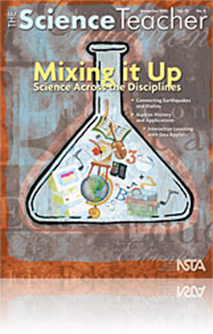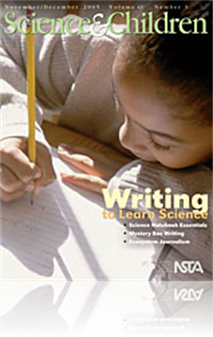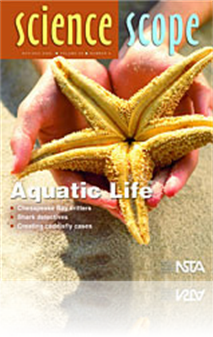All Resources
Journal Article
A Message from the NSTA President
NSTA has unveiled a new name--and an enriched format--for its time-honored conventions. The NSTA national and area conventions will now be called NSTA Conferences on Science Education. Teachers will benefit from the wealth of information contained in...
Journal Article
Science 101: What writing represents what scientists actually do?
This article addresses whether or not a report based on scientific method accurately represents what scientists do as well as what kind of writing scientists engage in that goes beyond the reporting of conclusions....
Journal Article
Scope on Safety: Having a blast, safely! Model rocketry safety guide
Model rocketry is a blast, and it's one of the best ways to get students interested in the physical sciences. However, following safety guidelines is essential. This article contains valuable information for safely launching rocketry into your scienc...
Journal Article
Science Shorts: Seeing What We Can’t See
While observation is critical to science, sometimes we cannot observe things directly. Sometimes things happened long ago (in paleontology, for example) or are too small to observe (like atoms). Many students believe that science progresses only thro...
Journal Article
Connecting Earthquakes and Violins
Violins, earthquakes, and the "singing rod" demonstration all have something in common--stick-slip frictional motion. This article begins with a typical classroom experiment used to understand the transition between sticking and slipping, proceeds to...
Journal Article
Throwing Paper Wads in the Chemistry Classroom: Really Active Student Learning
It is well-known that too many students learn to “plug and chug” formulas while gaining very little concomitant understanding of the underlying concepts. Active engagement in the classroom is one of the best tools available for overcoming concept...
Journal Article
Point of View: Students, Butterflies, and Cancer
This article accounts one research scientist's interest in butterflies and his aversion to dealing with cancer with it hitting so close to home. Prefering to emphasize problem-solving skills rather than recall, this scientist finds himself studying ...
Journal Article
Effectiveness of a Lab Manual Delivered on CD-ROM
Although electronic instructional media are becoming increasingly prevalent in science classrooms, their worth remains unproven. We assessed student perceptions and performance using CD-ROM delivery of lab materials and discovered numerous learning b...
Journal Article
Science Sampler: Hypothesis-based learning
Are visions of students hypothesizing, designing experiments to test their explanations, analyzing data, writing formal publications of results, and debating over scientific procedures in an attempt to justify their control of variables dancing in yo...
Journal Article
Science Sampler: Shark detectives
Oceans are often considered mysterious, fascinating places filled with unique and scary animals. One of the most misunderstood and therefore the scariest animals is the shark. This student-directed activity involves research, deductive reasoning, and...
Journal Article
The Early Years: The Nuts and Bolts of Discovery Centers
Young children are born scientists, exploring everything in their world around them. Yet, many teachers still find it hard to integrate science into the daily schedule. However, open-ended science or discovery centers are a perfect way for teachers t...
Journal Article
Science and History Come Alive in the Cemetary
History and science are brought to life for students during a field trip to a local cemetery or as part of a homework assignment. This exciting activity integrates history into the science curriculum, and helps students develop an understanding about...
Journal Article
LabWrite: Transforming Lab Reports from Busy Work to Meaningful Learning Opportunities
Lab reports are the dreaded assignments of the laboratory course. Students dislike them, because they can be tedious and time-consuming. Instructors dislike them, because they significantly increase the grading load. For this reason, lab reports are ...






